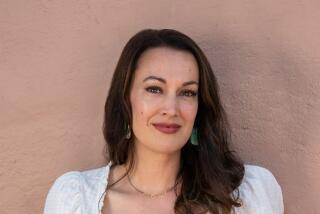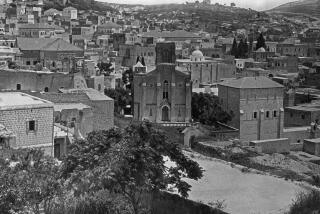‘Punch Doll’ Springs Back to Help Others
- Share via
CAPE TOWN, South Africa — In 1993, Judy Mayotte was working with villagers displaced by Sudan’s civil war when a relief plane dropped an airlift of emergency food.
The pilot misjudged the target area. A 200-pound bag of grain smashed into Mayotte’s leg, breaking it in 10 places, damaging her knee and dislocating her hip. Days later, doctors amputated her lower leg.
“Fortunately, the leg knocked off was my polio leg,” the gray-haired former Chicagoan, now 69, said with a laugh. “I’ve always been lucky.”
Mayotte, now helping create a master’s degree in peace, leadership and development at the University of the Western Cape in South Africa, has made a remarkable career of bouncing back from disaster. Pushed out of her troubled home as a child, she became a nun and an international expert on the displaced. Stricken with polio, she learned to walk again. Widowed after leaving her order and marrying the love of her life, she became an acclaimed television producer and author. Injured in a war zone, she became a determined advocate for peace.
“She’s like a punch doll. She’s indomitable. Against amazing odds she keeps coming back,” said Kathy Beal, a longtime friend and fellow former nun in Washington, D.C. “She considers herself very fortunate.”
Mayotte, who is slight with wire-rim bifocals, a quick laugh and unrelenting energy, bustles around her Cape Town apartment shoving a walker in front of her. More than half a century after contracting polio she is suffering delayed nerve damage and muscle weakness, but that -- and her missing leg -- hasn’t slowed her down much.
As a board member of the Desmond Tutu Peace Foundation, she is helping shepherd an exchange program of Milwaukee’s Marquette University aimed at developing leaders in touch with Third World social issues. She is also teaching a class on grass-roots leadership and community development at the University of the Western Cape, drawing students from African conflict zones ranging from Nigeria’s Niger Delta to post-genocide Rwanda and the Democratic Republic of Congo.
The idea, she said, is to find a way to stop conflicts before they start. After working with refugees and the displaced in Cambodia, Somalia, Afghanistan and other trouble zones, she is convinced that more attention to “soft issues” -- poverty reduction, environmental protection, women’s rights, sustainable economies -- is the key to greater international security and peace.
“I believe if we’re able to change the way we think, this war-and-weapons mentality we’ve lived with for generations, things can be different,” she said. On her kitchen table sits a framed African proverb: “When two elephants fight, it is the grass that gets trampled.”
“She’s an on-the-ground working saint,” said John Callaway, a longtime Chicago public television journalist who worked with Mayotte in the 1970s.
“God smiles looking down at her,” added Archbishop Tutu, a Nobel Peace Prize winner. “She’s a wonderful advertisement for God and goodness.”
But her upbringing was bleak. Her mother called her “the world’s worst child who ever drew a breath,” Mayotte said, and threw buckets of cold water on her when she cried. Her father, a prominent businessman and country club member, drank heavily and was sometimes abusive. When Mayotte was old enough to go to school, her parents shipped her off to a Catholic boarding school in Wichita, Kan., where they lived.
There, “I went to sleep without being afraid for the first time in my life,” she said. The little girl with shattered self-confidence thrived on the security and sense of belonging. In time, she converted to Catholicism and announced that she wanted to become a nun, over her enraged father’s objections.
But before joining an order, the 18-year-old college freshman came down with polio, the same year Salk’s vaccine arrived on the market. She refused to listen to those who told her she would never regain the use of her right side. In two years, she had learned to walk again.
At 21, she joined the Sisters of Charity of the Blessed Virgin Mary, a Roman Catholic teaching order that took her to schools in Kansas City, Mo., and Milwaukee and provided her with an introduction to social justice issues as the nuns volunteered with the homeless. But the Catholic Church’s controversial Vatican II reforms in the early 1960s shook her sense of belonging. In 1967, at 31, she left her order.
“It just wasn’t right for me anymore,” she said. “It wasn’t the same church.”
Adrift and penniless, she focused on finishing a doctorate at Marquette University and took a secretarial temp job at an electric firm in Milwaukee to make ends meet. There she ran into Jack Mayotte, the company’s regional boss, who eventually became a friend and, four years later, her husband.
“He loved me just for me. He was amazing,” she said with a broad smile. “He had such a love of life. He played the saxophone. He had a wonderful sense of humor. He knew every ice cream store in town.”
After witnessing her parents’ troubled marriage, she said, “I didn’t know a relationship could be like that.”
But what she calls the “happiest years of my life,” spent with Jack Mayotte in Chicago, didn’t last long. After three years of marriage, he was diagnosed with cancer. Six weeks later, he died.
Judy Mayotte, bereft, threw herself back into work. Trying her hand at public broadcasting, she eventually produced one in a series of Emmy-winning portraits of U.S. states for Turner Broadcasting Corp. Then she joined the Maryknolls, a Catholic missionary order, hoping to spend five years in Somalia. But a doctor treating her for a longtime heart disorder insisted that she couldn’t be so far from medical care. She left the order and promptly landed a MacArthur Foundation grant to write a book on refugees.
“In some sense I grew up as a refugee by being sent away from home. I could empathize with rootlessness,” she said.
For the next nine years, she traveled through the world’s war zones, documenting the lives of refugees and the displaced from Sudan to Laos, crossing borders illegally and ducking gunfire.
What she learned, she said, was that refugees were “human beings, one by one, just like you and me. Except their lives have totally been turned upside down and their roots broken. Just a day earlier, they were farmers and engineers and teachers and mothers and fathers.”
The accident in southern Sudan ended her fieldwork. Damage to her knee was so severe that efforts to fit a prosthetic leg proved impossible. But as she struggled to decide what to do next, offers poured in. The Clinton administration approached her to become an advisor on refugee policy. Johns Hopkins University in Baltimore asked her to develop a course on refugee issues. She landed a teaching job at Seattle University, a Jesuit college, and later an endowed chair at Marquette.
“It’s really hard to lose your leg when you’re in the middle of doing exactly what you want to do. But then all these other things fell in my lap. My whole life has been like that. Something has come after I lost something else,” she said.
Now, she said, a lifelong desire for peace -- for herself and for others -- has brought her to Tutu’s peace center.
“People will always be in conflict,” she said. “It’s part of life, how we’re challenged to change and grow. The question is, how do you deal with it in a productive way?”
More to Read
Sign up for Essential California
The most important California stories and recommendations in your inbox every morning.
You may occasionally receive promotional content from the Los Angeles Times.













